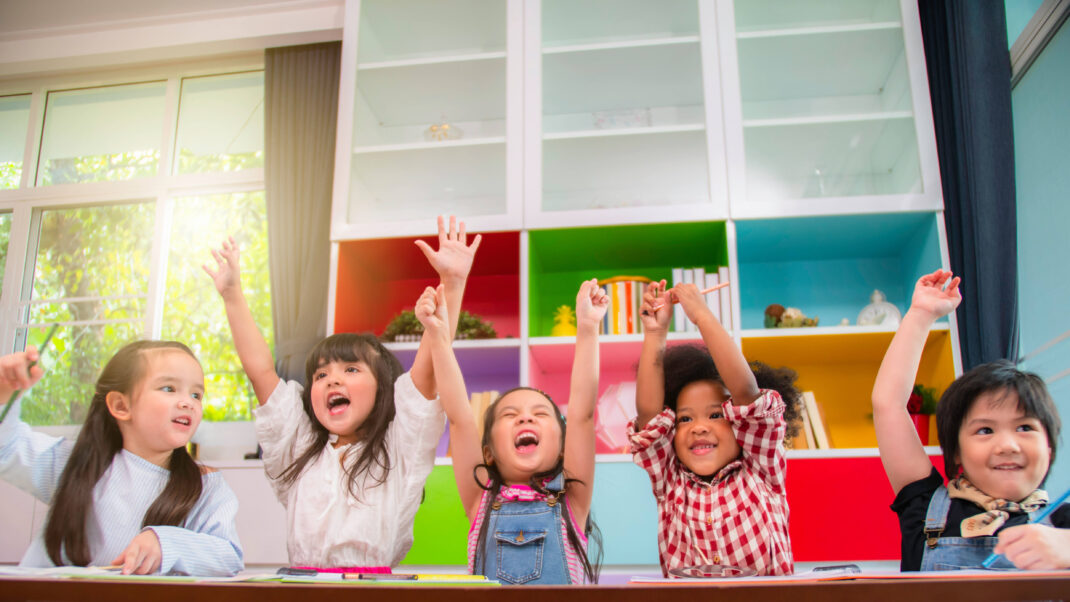The Benefits of Socialization for Young Children

Socialization plays a pivotal role in children’s development but in the past, when students tested positive for COVID-19, they would remain home for at least five days and then return to school or daycare with a mask for a set period. Prior to March 2024, the COVID-19 pandemic closed all schools and overwhelmed parents and child care centers. You can imagine what that may have done to the social skills of young children. The most recent mandate allows children to return to school after being fever-free for 24 hours without medication.
So, you may be curious what these new policies look like for your daycare provider, and how they can facilitate the socialization of your child while prioritizing health and safety. Read on for practical tips and insights.
Understanding the Importance of Socialization
Socialization shapes a child’s cognitive, emotional, and social skills, laying the groundwork for a lifetime of success and happiness. Through interactions with peers, children also learn important lessons in empathy, cooperation, and communication, which are essential for healthy relationships and emotional resilience. Below are some key benefits:
Improved Social Skills – As the word implies, socialization allows children to interact with their peers and adults. From taking turns with toys to sharing to setting boundaries, socializing is essential for everyday life.
Increased Emotional Development – When children socialize with others, they can experience a range of emotions and learn how to regulate them appropriately. This leads to healthy relationships, overall well-being, and the ability to communicate effectively.
Refined Communication – When in social settings, children have the opportunity to communicate with a variety of people. They can express their thoughts, which results in improved confidence and self-esteem, and they also learn how to listen to others effectively. Unfortunately, however, the COVID-19 pandemic has disrupted traditional socialization avenues, posing challenges for daycare providers in meeting children’s social needs.
Challenges and Concerns
Since the COVID-19 pandemic began, teacher’s and daycare providers have struggled to promote impactful socialization, limited by restrictions on group sizes, physical distance guidelines, and virus transmission, significantly hindering specific sensory play. On top of the traditional difficulties and demands of running daycares and early education centers, this creates a stressful environment for children, families, and staff members.
Practical Strategies for Safe Socialization
Despite these challenges, look to see that your daycare provider has implemented practical strategies to facilitate safe social interactions for your child. Maintaining small groups or “pods,” organizing outdoor activities, and incorporating creative alternatives to traditional socialization, such as virtual playdates or pen-pal exchanges, can help mitigate risks while promoting engagement and connection.
Supporting Emotional Well-Being
It’s no secret that the pandemic brought on intense emotions, from loneliness to anxiety to stress and depression. A level of frustration may arise as your child continues to navigate changes in their social routines. As a parent, check in with your daycare provider frequently to ensure they are creating an environment where your child feels heard, valued, and supported.
You should also ask how they encourage open communication, validate your child’s feelings, and offer reassurance to help them cope with their challenges. What can this look like, exactly?
Show Affection – Pleasant facial expressions, a calm tone of voice, gentle touches like a pat on the back, handshake, or hug constitute affection. Studies show this conduct is critical to a child’s well-being in early education, creating solid relationships and modeling appropriate behavior.
Establish Respect – Children are more likely to share their thoughts, ideas, and feelings with active listeners. Children are also more open when teachers show sensitivity and validate their feelings.
Collaboration with Parents and Guardians
Family communication is key at 3Rs Early Learning Center in Brooklyn Park, MN. More than ever, establishing effective partnerships with parents is paramount to promoting socialization and addressing children’s needs. Clear and transparent communication regarding safety protocols, socialization strategies, and children’s emotional well-being fosters trust and collaboration between daycare providers and families. By working together, providers and parents can create a cohesive support system that prioritizes the holistic development of children.
Learn How to Create a More Safe Environment
In the face of the COVID-19 pandemic, daycare providers play a vital role in supporting children’s socialization and emotional well-being. By understanding the importance of socialization, addressing challenges with creativity and diligence, and fostering collaboration with parents, providers can create a safe and nurturing environment where children can thrive.
Do you know if your daycare provider offers flexible and adaptable socialization strategies that align with current safety recommendations? By remaining vigilant and proactive, daycare providers can navigate these uncertain times with resilience and resourcefulness, but it’s up to you to fully examine your child’s environment.
3Rs Early Learning Center in Brooklyn Park, MN’s mission is to improve the lives of children, parents, and staff by providing safe, fun, curriculum-focused early education in a collaborative and child-focused environment. Connect with us today to learn more.